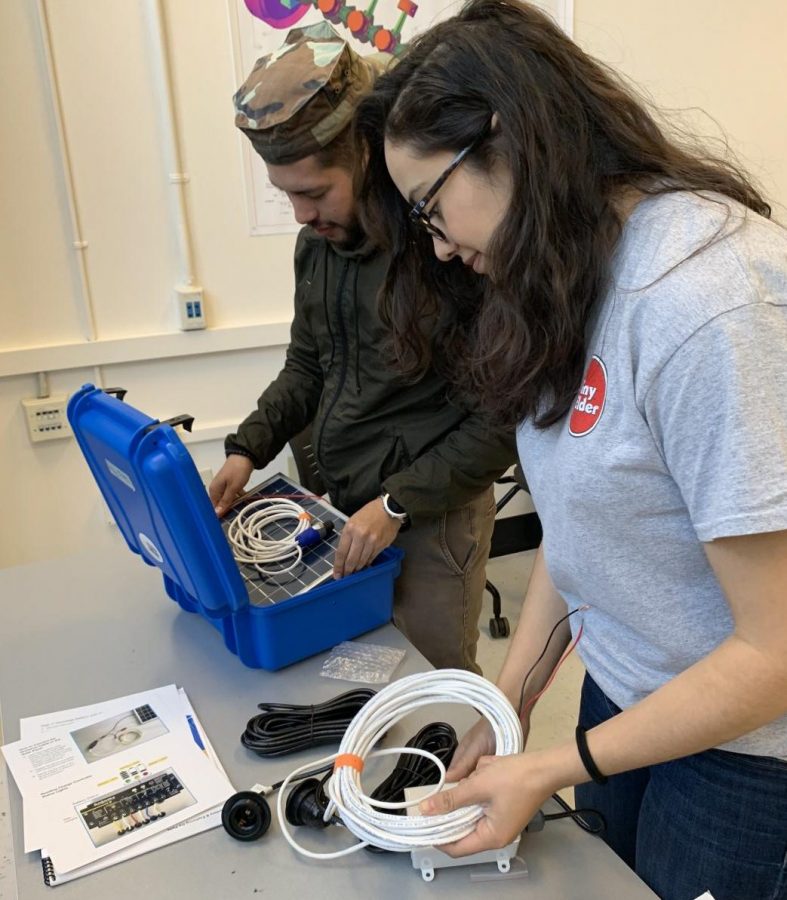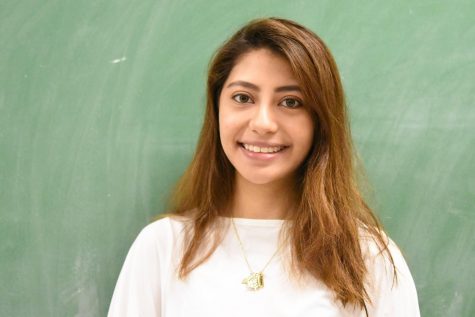Suitcase brings solar innovation
STEM majors Christan Vazquez (left) and Vaness Hernandez test out the solar power suitcase during the Society of Hispanic Professional Engineers meeting on Friday in the Physical Science Building. Prototypes of the suitcases are being built to help third world countries with no electricity.
Mar 20, 2019
In a partnership with We Care Solar through Cal State-East Bay, the Society of Hispanic Professional Engineers (SHPE) at Contra Costa College is working to build prototypes of solar-powered suitcases in hopes of providing renewable energy to developing countries.
These suitcases offer SHPE members the opportunity to learn how to use technology in an eco-friendly manner.
Full-size models of the suitcases are slated for construction with the help and supervision of the We Care Solar team and eventually shipped to a country in need of resources.
If successful, the suitcases will eventually be used to provide electricity to hospitals and other buildings.
SHPE member Rudy Suarez said the club has been looking for ways to bring the suitcase model his team builds to local high schools so students there can learn about technology and the impact it can have on those in need.
“The suitcases are for educational purposes and we want to share this knowledge with our community,” Suarez said.
SHPE is a nationwide organization that works to empower underrepresented students in Science Technology Engineering and Mathematics (STEM)fields.
The club also wants to spread information about the technology to CCC students of any major, since its applications are a way to offer immediate aid.
The club believes simple math skills and the knowledge of basic engineering, are important live-enhancing skills that can be obtained easily through help from the club.
SHPE club adviser Mark Wong said all the solar suitcases were funded by the non-profit organization We Care Solar.
At CCC, the Adelante and STEM academy also work to provide students with the skills to compete in an advancing job market.
In the past, SHPE club members found other eco-friendly ways to offer solutions to members of the local community. In 2016, the club promoted an E-bike challenge which tested students engineering skills in creating an actual electric vehicle.
In that competition, students used skills that would be valuable with real-world applications.
Wong, who was also adviser to the club at the time, said members in science workshops for elementary and secondary students expand their social skills and build personal connections.
The club meets every Friday at 8 a.m. in the Physical Science Building computer lab and is currently recruiting new members.
Although the club does have the word Hispanic in its title, club members maintain any person interested is able to join the club no matter who they are or what their major may be. A movie night to raise funds for the club will be held Thursday in GE-225 from 6 to 8 p.m.
As an organization, SHPE has been helping students for over 40 years and the solar-powered briefcases are just the latest iteration of that work.
The solar briefcase project was inspired by co-founder Laura Stachel while traveling to Northern Nigeria where she witnessed terrible hospital conditions due to the lack of resources in the area.
As evidence of their success, Dr. Stachel and her husband started to make more solar suitcases and ship them to areas in need.
SHPE, along with help from We Care Solar, aims to assist others in educating themselves about renewable energy and simple engineering that can spread awareness.
Worldwide, nearly 1.3 billion people live with an inadequate source of energy according to the International Energy Acency’s database and methodology.
Asia has nearly 622 million people who live without electricity with North Africa holding the same with just over 620 million.
Latin America and the Middle East round out the group with 17 and 22 million people living in near blackout conditions.
In remote locations, where generators are not an option, the company provides headlamps and personal solar-powered lanterns to people in need.
Longterm, the expectation is that solar- powered equipment will decrease infant mortality rates in developing nations. And CCC students are doing their part to help.



